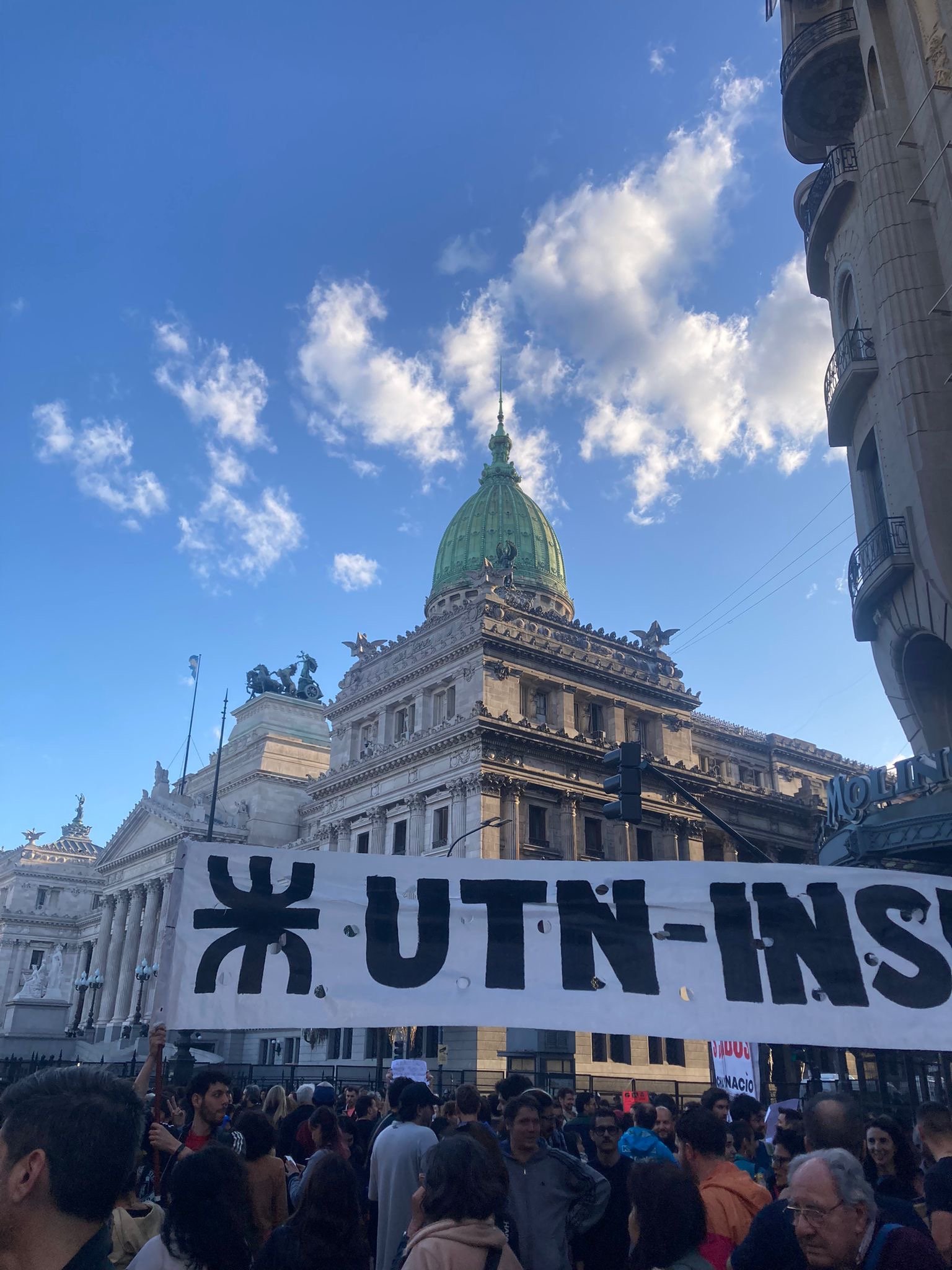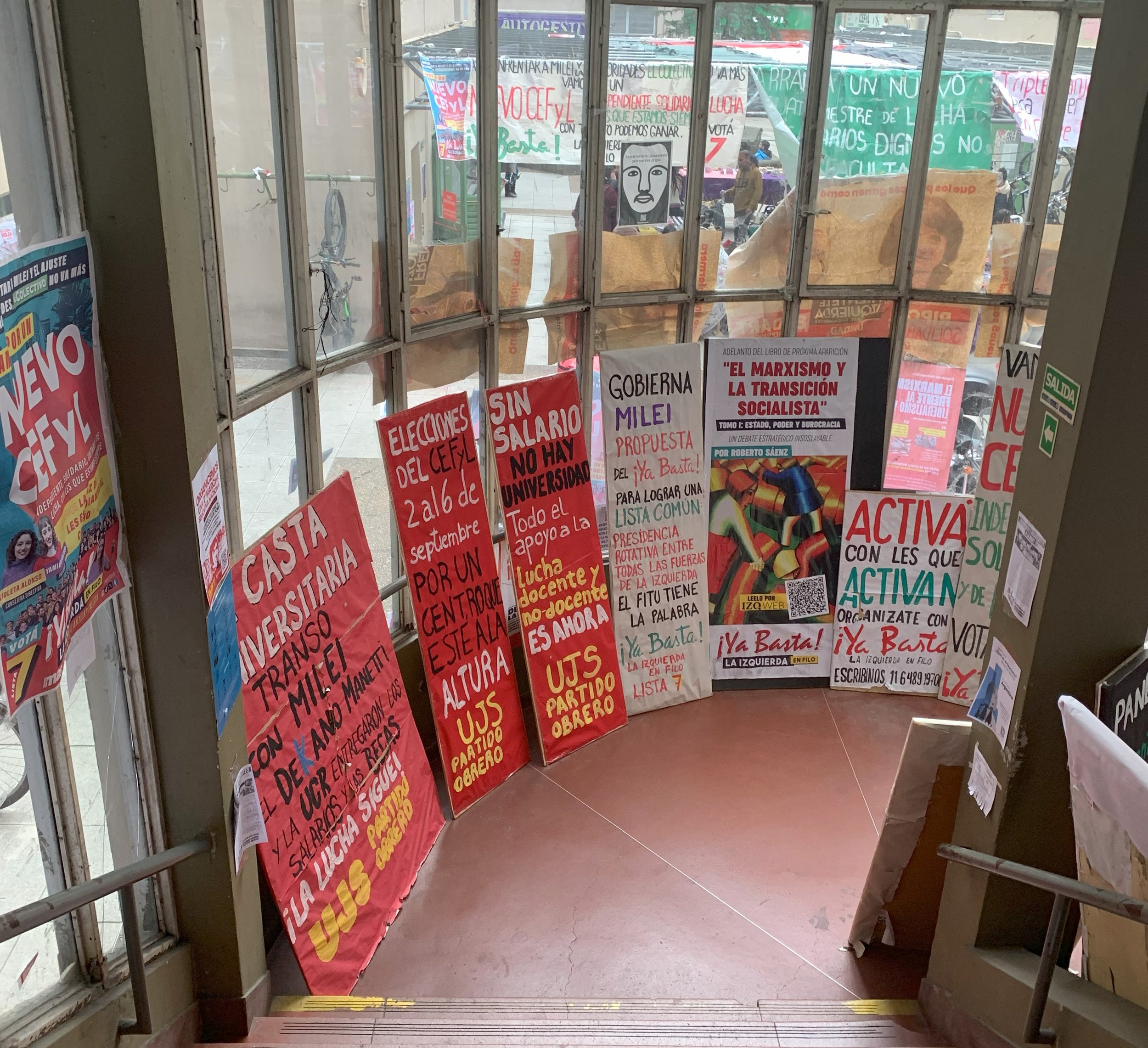Public university on the brink: Higher education under threat in Argentina
Courtesy of Matthew Osborne
Argentina’s public university system, a well-established and cherished national symbol, is at risk of crumbling after President Javier Milei vetoed the proposed Ley de Financiamiento Universitario (University Financing Law), despite it having passed through Congress. Instead, his proposed 3 billion pesos funding will amount to a 30.1% decrease on last year, taking into account inflation. This punitive measure was met with resistance from the community: students, teachers and supporters of public education responded with strikes, protests, marches on Congress and ‘occupations’ of key university sites.
Milei’s veto comes at a time when public universities in Argentina are already struggling. The proposed law had sought to combat this by allocating funding which would take into account rising costs and inflation, and allow for better distribution of funds across the country depending on student numbers. It aimed to restore dignified salaries to university employees: in the period between November 2023 and August 2024, university teachers suffered a real terms purchasing power decrease of 23.71% against inflation. The failure to pass this bill will put immense strain on this already struggling system: as of October 2024, 70% of teaching staff obtain monthly pay below the poverty level; buildings lack the adequate infrastructure and maintenance; and scholarship programmes to help those in financial need are at risk of disappearing. Milei’s proposed budget for the university system in the coming year covers a mere 50% of what is needed for public university education to continue functioning, according to the Consejo Interuniversitario Nacional (National Inter-University Council).
Courtesy of Matthew Osborne
Perhaps one of the most warped aspects of the whole saga has been the language used to justify such cuts to a system which aims to democratise access to education and aid social mobility. Milei has suggested that free higher education is no more than a ‘myth’, which leads to the poor subsidising this privilege for the rich. Somewhat unsurprisingly, this accusation came packaged in a wider attack on the university system, as he implied the existence of an ideological agenda which sought to rewrite, or in his terms ‘to dirty and prostitute’, a once-noble history. His comments came as he re-named the important Centro Cultural Néstor Kirchner, after the centre-left politician of the early 2000s, to Centro Cultural Domingo Faustino Sarmiento, author of the problematic Facundo: Civilización y barbarie. Notably, the Argentinian population does not believe his claim: 80% answered that public university favours social mobility in a survey by Zuban Córdoba y Asociados. There is, then, public recognition that Milei’s claimed asymmetry is not borne out in reality. A large proportion of students in the Argentinian university system do come from low-income households, and in 2022, 62.3% of students in public universities were first generation university goers, even if the range differs greatly between provinces. This year, a study by ExQuanti using the Encuesta Permanente de Hogares del INDEC found that no less than 48.5% of university students are from poor or low-income households. Paradoxically, Milei has a lot to answer for in this figure which rose from 27.9% in September 2023, and is largely a consequence of his own economic measures which have pushed an even greater proportion of the population into poverty. To further reduce the university budget is to reduce the ability of this system to offer classes with adequately paid staff and to help the poorest of these students obtain the basic requirements for studying at university.
Courtesy of Pablo Luis Filatina
In response to Milei’s provocations and proposed cuts, the Consejo Interuniversitario Nacional called for a protest march, which took place on October 2nd. It was the second of its kind since Milei took office in December 2023, with the first on 23rd April. This protest was followed by a series of changes to the running of certain universities, prompted by the students in solidarity with the teaching body: for all, it marked a sustained campaign to raise awareness about the dire situation. While most faculty sites of the Universidad de Buenos Aires had long borne large signs proclaiming that without dignified salaries, the institution could not function, certain faculties chose to take this one step further with tomas (takeovers) of key sites. In practice this meant the cancellation of a large number of classes, before the eventual realisation of public classes outside the university building on tables and chairs which had been carefully stationed ready for the protest. These sessions were called chaotic and loud: bicycles and motorbikes dangerously weaved among the students and teachers, ignoring the Calle cortada (road closed) signs, while passing cars and vans tooted loudly in support. Importantly, these classes were open to anyone who wanted to join, epitomising the very theory behind a public education system. Although this presented various difficulties, it certainly shed light on the degree of discontent among the university population and the urgency of the situation. And it did not dissuade students: the sites were bustling, the many who live in Gran Buenos Aires still made the long commute into the centre to participate in these symbolic acts of protest in learning, while queues continued to form for medialunas and café con leche from the small stands which had moved outside with the students. There was a sense of solidarity among all involved, from the vendors to the teachers to the students to the passing drivers (mostly). This is indicative of the general public reaction: both the April and October protests were some of the largest in the country’s recent history. In the Zuban Córdoba y Asociados study mentioned above, 99% answered that education is a tool for national growth.
Courtesy of author
Perhaps this context should be a wakeup call to every country to open dialogues about what the role of universities should be. A fair and functioning public higher education system should promote social mobility and democratic access to education and opportunity. By the end of my term here in Buenos Aires, classes had moved back inside, but the signs and banners stayed plastered around the sites, meaning not a second passed in which the wider situation was not painfully present. While emails confidently continue to go out to exchange students about their terms here next year, among some students at the UBA and UNSAM, the conversation was if, not when, next term will start. Although the various measures by the university community have clearly not convinced Milei to reverse his measures, he has released statements which suggest that he does not intend to privatise universities. Yet, the system needs adequate funding to be more than a mere symbol. Public institutions, their employees and those who use their services, not only in Argentina, deserve this at least.



